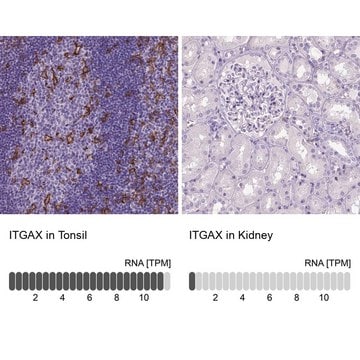詳細
We are committed to bringing you greener alternative products, which adhere to one or more of The 12 Principles of Green Chemistry.This antibody is Preservative-free, produced without the harm or sacrifice of animals and exceptionally stable to allow for ambient shipping and storage if needed and thus aligns with "Waste Prevention", "Designing Safer Chemicals" and "Design for Energy Efficiency".
Click here for more information.
ZooMAb® antibodies represent an entirely new generation of recombinant monoclonal antibodies.Each ZooMAb® antibody is manufactured using our proprietary recombinant expression system, purified to homogeneity, and precisely dispensed to produce robust and highly reproducible lot-to-lot consistency. Only top-performing clones are released for use by researchers. Each antibody is validated for high specificity and affinity across multiple applications, including its most commonly used application. ZooMAb® antibodies are reliably available and ready to ship when you need them.
特異性
Clone 3K10 is a ZooMAb® Rabbit recombinant monoclonal antibody that specifically detects La-related protein 1 (LARP1). It targets an epitope within 23 amino acids from the N-terminal half.
免疫原
KLH-conjugated linear peptide corresponding to 23 amino acids from the N-terminal half of human La-related protein 1 (LARP1).
アプリケーション
Quality Control Testing
Evaluated by Western Blotting with His-ABP-tagged recombinant fragment of Human LARP1.
Western Blotting Analysis (WB): 1:10,000 dilution of this antibody detected His-ABP-tagged recombinant fragment of Human LARP1.
Tested Applications
Western Blotting Analysis: A representative lot of this antibody detected LARP1 in MOLT4 and HeLa cell lysates (1:10,000 dilution) and HeyA8, HeLa, OVCAR-8 wild type, and OVCAR-8 LARP1 KO cells (1:5000 dilution).
Immunocytochemistry Analysis: A representative lot of this antibody detected LARP1 in HepG2 cells (1:100 dilution), OVCAR-8 wild type and LARP1 knockdown cells (1:500 dilution) and OVCAR-8 wild type and LARP1 KO cells (1:2000 dilution).
Immunohistochemistry (Paraffin) Analysis: A representative lot detected LARP1 in human cerebellum tissue sections (1:1000 dilution) and human colorectal cancer tissue sections (1:100 and 1:200 dilutions).
Immunoprecipitation Analysis: A representative lot of this antibody was used to immunoprecipitate LARP1 from OVCAR-8 cancer cells.
Affinity Binding Assay:: A representative lot of this antibody bound LARP1 peptide with a KD of 2.3 x 10-7 in an affinity binding assay.
Note: Actual optimal working dilutions must be determined by end user as specimens, and experimental conditions may vary with the end user.
ターゲットの説明
La-related protein 1 (UniProt: Q6PKG0; also known as La ribonucleoprotein domain family member 1) is encoded by the LARP1 (also known as KIAA0731, LARP) gene (Gene ID: 23367) in human. La-related protein 1 (LARP1) is a cytoplasmic RNA-binding protein that promotes translation of specific classes of mRNAs downstream of the mTORC1 complex. It contains 1 HTH La-type RNA-binding domain (aa 397-487) and it associates with the mRNA 5′cap in an mTOR-dependent manner. It associates with mRNAs containing a 5′ terminal oligopyrimidine (5′TOP) motif, which is present in mRNAs encoding for ribosomal proteins and several components of the translation machinery. It is also shown to associate with actively translating ribosomes via interaction with polyadenylate-binding protein 1 (PABPC1/PABP) and stimulate translation of mRNAs containing a 5′TOP, thereby regulating cell growth and proliferation. LARP1 undergoes phosphorylation on multiple serine and threonine residues in response to active mTORC1. These phosphorylations are important for interaction with RPTOR and the mTORC1 complex. Phosphorylation also promotes dissociation from the 5′UTR of mRNA molecules with a 5′TOP motif. LARP1 levels are up-regulated in a number of hepatocellular carcinoma cell lines and liver cancer lesions, as well as in patients with hepatocellular carcinoma with a lower survival rate. Two isoforms of LARP1 have been described that are produced by alternative splicing. This ZooMAb® recombinant monoclonal antibody, generated by our propriety technology, offers significantly enhanced specificity, affinity, reproducibility, and stability over conventional monoclonals. (Ref.: Fonseca, BD et al. (2015). J. Biol. Chem. 290(26):15996-6020; Tcherkezian, J., e tal. (2014). Genes Dev. 28(4); 357-371; Xie, C., t al. (2013). J. Transl. Med. 11; 272).
物理的形状
Purified recombinant rabbit monoclonal antibody IgG, lyophilized in PBS, 5% Trehalose, normal appearance a coarse or translucent resin. The PBS/trehalose components in the ZooMAb formulation can have the appearance of a semi-solid (bead like gel) after lyophilization. This is a normal phenomenon. Please follow the recommended reconstitution procedure in the data sheet to dissolve the semi-solid, bead-like, gel-appearing material. The resulting antibody solution is completely stable and functional as proven by full functional testing. Contains no biocide or preservatives, such as azide, or any animal by-products. Larger pack sizes provided as multiples of 25 µL.
再構成
300 µg/mL after reconstitution at 25 µL per vial. Please refer to guidance on suggested starting dilutions and/or titers per application and sample type.
保管および安定性
Recommend storage of lyophilized product at 2-8°C; Before reconstitution, micro-centrifuge vials briefly to spin down material to bottom of the vial; Reconstitute each vial by adding 25 µL of filtered lab grade water or PBS; Reconstituted antibodies can be stored at 2-8°C, or -20°C for long term storage. Avoid repeated freeze-thaws.
法的情報
ZooMAb is a registered trademark of Merck KGaA, Darmstadt, Germany
免責事項
Unless otherwise stated in our catalog or other company documentation accompanying the product(s), our products are intended for research use only and are not to be used for any other purpose, which includes but is not limited to, unauthorized commercial uses, in vitro diagnostic uses, ex vivo or in vivo therapeutic uses or any type of consumption or application to humans or animals.





